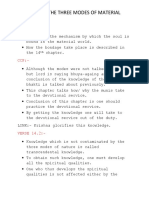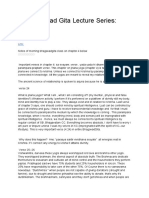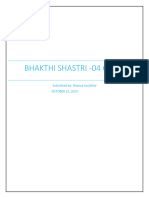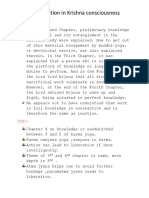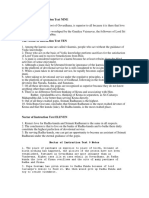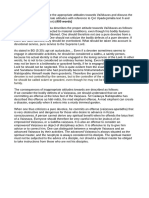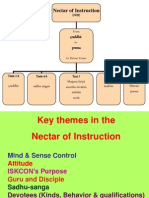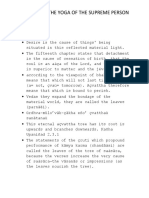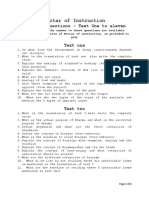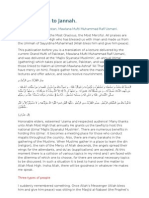100%(1)100% found this document useful (1 vote)
301 viewsChapter 12 Devotional Service: VERSE 12.1
Chapter 12 Devotional Service: VERSE 12.1
Uploaded by
gaurnityanandaThis document provides an overview and commentary on Chapter 12 of the Bhagavad Gita. It discusses the progression of devotional service from fixing one's intelligence on Krishna to engaging in activities for Him. The commentary explains that worshipping Krishna's personal form through devotional service is superior to impersonal concepts as it is easier and brings liberation without difficulty. Krishna offers a descending ladder of spiritual practices so that everyone can engage in bhakti according to their ability.
Copyright:
© All Rights Reserved
Available Formats
Download as DOCX, PDF, TXT or read online from Scribd
Chapter 12 Devotional Service: VERSE 12.1
Chapter 12 Devotional Service: VERSE 12.1
Uploaded by
gaurnityananda100%(1)100% found this document useful (1 vote)
301 views22 pagesThis document provides an overview and commentary on Chapter 12 of the Bhagavad Gita. It discusses the progression of devotional service from fixing one's intelligence on Krishna to engaging in activities for Him. The commentary explains that worshipping Krishna's personal form through devotional service is superior to impersonal concepts as it is easier and brings liberation without difficulty. Krishna offers a descending ladder of spiritual practices so that everyone can engage in bhakti according to their ability.
Original Description:
12
Original Title
BG CHAPT 12
Copyright
© © All Rights Reserved
Available Formats
DOCX, PDF, TXT or read online from Scribd
Share this document
Did you find this document useful?
Is this content inappropriate?
This document provides an overview and commentary on Chapter 12 of the Bhagavad Gita. It discusses the progression of devotional service from fixing one's intelligence on Krishna to engaging in activities for Him. The commentary explains that worshipping Krishna's personal form through devotional service is superior to impersonal concepts as it is easier and brings liberation without difficulty. Krishna offers a descending ladder of spiritual practices so that everyone can engage in bhakti according to their ability.
Copyright:
© All Rights Reserved
Available Formats
Download as DOCX, PDF, TXT or read online from Scribd
Download as docx, pdf, or txt
100%(1)100% found this document useful (1 vote)
301 views22 pagesChapter 12 Devotional Service: VERSE 12.1
Chapter 12 Devotional Service: VERSE 12.1
Uploaded by
gaurnityanandaThis document provides an overview and commentary on Chapter 12 of the Bhagavad Gita. It discusses the progression of devotional service from fixing one's intelligence on Krishna to engaging in activities for Him. The commentary explains that worshipping Krishna's personal form through devotional service is superior to impersonal concepts as it is easier and brings liberation without difficulty. Krishna offers a descending ladder of spiritual practices so that everyone can engage in bhakti according to their ability.
Copyright:
© All Rights Reserved
Available Formats
Download as DOCX, PDF, TXT or read online from Scribd
Download as docx, pdf, or txt
You are on page 1of 22
At a glance
Powered by AI
The text discusses the superiority of devotional service over impersonal worship and speculative knowledge. It also describes various qualities that a pure devotee possesses.
The progressive stages of devotional service mentioned are faith, association with devotees, performance of sacrifice, philosophical search for truth, realization of one's eternal relationship with Krishna.
Faith endears Krishna most according to the text.
CHAPTER 12 DEVOTIONAL SERVICE
VERSE 12.1:-
In the twelfth chapter, the superiority of
all types of devotees to the jïänés is
described, and among the devotees those who
are endowed with wonderful qualities like
lack of hatred are praised.
CCP:-
Last chapter in the bhakti section.
1st six chapters from karma to the bhakti
last six chapters jnana to bhakti.
After hearing about the majesty of the lord
Arjuna is asking about the impersonal aspect
of the lord.
Here Krishna will talk about the ekatvena
mentioned in the 9.15.
1-7 worship of the personal form is superior
to the impersonal worship.
8-12 progressive stages of the devotional
service.
13-20 qualities which endear the Krishna.
LINK:- krishna uses the unambiguous words to
establish the superiority of the bhakti.
VERSE 12.2:-
sättviky ädhyätmiké çraddhä karma-çraddhä tu
räjasé
CHAPTER 12 DEVOTIONAL SERVICE
tämasy adharme yä çraddhä mat-seväyäà tu
nirguëä
Faith directed toward spiritual life is in
the mode of goodness, faith rooted in
fruitive work is in the mode of passion,
faith residing in irreligious activities is
in the mode of ignorance, but faith in my
devotional service is purely transcendental.
SB 11.25.27.
CCP:-
Most important point is that their faith is
transcendental. Not that they transcend the
Krishna.
The words like mam and mayi indicate the
personal form and here there is no light
speaking- this indicate that the personalist
are most intimately united with me.
LINK: - further clarifying the superiority
of the personalist.
VERSE 12.3, 4:-
Those who worship My impersonal svarüpa
known as Brahman are inferior because of
their state of suffering.
CCP:-
Krishna here is not speaking anything
negative about the impersonal worshippers.
CHAPTER 12 DEVOTIONAL SERVICE
VERSE 12.5:-
A living entity is eternally an individual
soul, and if he wants to merge into the
spiritual whole, he may accomplish the
realization of the eternal and knowledgeable
aspects of his original nature, but the
blissful portion is not realized. By the
grace of some devotee, such a
transcendentalist, highly learned in the
process of jïäna-yoga, may come to the point
of bhakti-yoga, or devotional service. At
that time, long practice in impersonalism
also becomes a source of trouble, because he
cannot give up the idea. Therefore an
embodied soul is always in difficulty with
the unmanifest, both at the time of practice
and at the time of realization.
The senses have the power for particular
knowledge such as sound, not for something
which does not possess particular qualities-
VCT
goal of impersonal Brahman which is attained
by such suffering is attained only by having
a mixture with bhakti. Without bhakti to the
Lord, the worshippers of the impersonal
Brahman obtain only suffering, and not
Brahman. Brahmä says:
teñäm asau kleçala eva çiñyate
nänyad yathä sthüla-tuñävaghätinäm
CHAPTER 12 DEVOTIONAL SERVICE
As a person who beats an empty husk of wheat
cannot get grain, one who simply speculates
cannot achieve self-realization. His only
gain is trouble. SB 10.14.4
The brahman without qualities is called
akñaraà.
The final result is the same, but one is
filled with difficulty and therefore
inferior, and the other is without
difficulty and superior.
CCP:-
For the embodied attachment to the
unmanifest is troublesome as very difficult
to conceive the Brahman.
Impersonal concept is very difficult to
think about.
Meditating on the impersonal aspect is like
creating the vacuum as the all material
concept are rejected and very difficult to
meditate.
Mayavadi argument that personal form is for
the less intelligent is false as nowhere the
lord says like that and no reference when
one is beyond embodiment then one can
meditate on the impersonal aspect of the
lord.
In passion we act on the bodily level, on
goodness one act on the intellectual level.
CHAPTER 12 DEVOTIONAL SERVICE
Goodness is more conducive to think about
the absolute reality.
Goodness makes the contemplation easy.
In the 1st six chapters the focus was on the
detaching from the body.
In the next six chapters focus is on the
focusing on the Krishna and practicing the
devotional service.
LINK: - makes clear the Krishna’s preference.
VERSE 12.6, 7:-
One simply has to practice the easy process
of Kåñëa consciousness and fully engage
himself in devotional service.
Without even having a method, I take them
over it. I quickly become their deliverer
from the ocean of saàsära.” Implied here is
that the Lord has affection for His
devotees, but not for the jïänés.
nayämi paramaà sthänam arcir ädi-gatià vinä
garuòa-skandham äropya yatheccham aniväritaù
According to My desire, unchecked, I bring
them to My dhäma, putting them on the
shoulders of Garuòa, without going via the
path of light. Varäha Puräëa
Even though one disregards prescribed
activities, bhakti brings one to the desired
goal.
CHAPTER 12 DEVOTIONAL SERVICE
yä vai sädhana-sampattiù puruñärtha-catuñöaye
tayä vinä tad äpnoti naro näräyaëäçrayaù
He who takes shelter of Näräyaëa attains the
goal of his practice without performing the
duties of artha, dharma, käma and mokña.
Näräyaëéya
sarva-dharmojjhitä viñëor näma-mätraika-
jalpakäù
sukhena yäà gatià yänti na täà sarve’pi
dhärmikäù
Those who utter the name of Viñëu giving up
all dharmas, easily attain the goal, whereas
those who follow all rules of dharma do not
attain it. Padma Puåäna
CCP:-
Same theme is being continued- mayyavesita
chetasam.
Krishna makes the point that this process is
easier as Krishna himself makes the
intervention.
As per Sridhar swami Krishna gives the
knowledge, not appreciated by the Vaishnava
acarya.
Any kind of work should be done for the
Krishna.
CHAPTER 12 DEVOTIONAL SERVICE
Narayaniya section of the Mahabharata is
devotional.
Prabhupad is analytical devotional in his
purports; rarely does he give the direct
instruction.
In the scriptures there are verses which are
informational and some are instructional.
Instructional verses are more important.
LINK: - various stages of the bhakti (8-12)
VERSE 12.8:-
The word eva excludes the impersonal aspect
of the Lord.
fix your intelligence, which has the power
of discrimination, upon Me. This means to
continually reflect on the statements of
scripture using intelligence, which will
result in meditation.
CCP:-
Krishna is giving the highest level;
generally we live where our subtle body
lives ex addict may be living in the well
furnished house but his mind is where the
substance of the addiction is.
We don’t live where our gross body is but
where our subtle body is.
So we live with the Krishna if our subtle
body is with the Krishna.
CHAPTER 12 DEVOTIONAL SERVICE
Here Krishna is offering descending ladder.
If one is not on the level of the highest
Krishna is offering the options, no is
ineligible to practice the bhakti.
We can practice the bhakti at whatever level
we feel competent.
Highest level is offer the mind and
intelligence to the Krishna.
Here mind is attached to the Krishna-8, pure
devotee can be taken away from the dhama,
but dhama cannot be away from the Krishna.
Then practice the fixing the mind on the
Krishna-9 practice sadhana bhakti, mind may
stray away but should not stay away.
Then working for the Krishna-10.
Once our desire for attaing the Krishna is
strong then we can fix the mind the Krishna
constantly.
VERSE 12.9:-
Repeatedly withdrawing the mind when it goes
here and there, and fixing the mind on Me is
called abhyäsa. By this method of abhyäsa
(abhyäsa-yogena), endeavor to attain Me- VCT
CCP:-
1-7 worship of the personal form is higher
to the worship of the impersonal Brahman.
8-12 progressive stages of the bhakti.
CHAPTER 12 DEVOTIONAL SERVICE
13-20 qualities that endear the Krishna.
Devotee is one who loves Krishna and krishna
loves him.
VERSE 12.10:-
“Become engaged in My supreme activities, in
activities meant for the highest benefit
(mat-karma-paramaù). Doing services (karmäëi
kurvan) such as hearing and singing about
Me, bowing to Me, worshiping Me, sweeping
and washing My temple, picking flowers,
[Note: These are external activities of
bhakti.] even without remembrance of Me as
previously described, you will attain
perfection (siddhim), characterized by being
one of My associates in prema.”
CCP:-
Mat parama –offering the mind and the body
everything to the Krishna.
Mat karma paramo-working for the Krishna.
Here perfection is used for the quest for
attaining the lord.
Directly doing Krishna’s work-book
distribution, cleaning the temple etc or the
offering the fruits of the work to the
Krishna-taking care of the family materially
and the spiritually.
Performing the work for the satisfaction of
the Krishna is devotional service.
CHAPTER 12 DEVOTIONAL SERVICE
LINK: - Krishna going one level down, his
accommodative nature.
VERSE 12.11:-
In Bhagavad-gétä (18.46) we find it is
stated, yataù pravåttir bhütänäm: if one
decides to sacrifice for the supreme cause,
even if he does not know that the supreme
cause is Kåñëa, he will come gradually to
understand that Kåñëa is the supreme cause
by the sacrificial method.
VCT- Bhakti-yoga has two types: being fixed
in bhakti through internal senses, and being
fixed in bhakti through external senses.
The first type of bhakti, using internal
senses, has three sub categories: smaraëa
ätmika and manana ätmika (mentioned in verse
8, using mind and intellect), and for those
who desire remembrance, but cannot do
continual remembrance, practice of the
above, called abhyäsa-rüpa (verse 9). These
three are difficult for a person with poor
intelligence, and easy to perform for one
with good intellect and no offenses.
The second type, relying on external senses,
is composed of hearing and chanting (verse
10). It is easy to perform for everyone.
Those who are qualified for performing both
methods (internal and external) are most
outstanding. This was stated in the second
CHAPTER 12 DEVOTIONAL SERVICE
six chapters. Those who cannot do this, who
do not have faith in fixing the senses on
the Lord, those who are qualified for
niñkäma-karma offered to the Lord as
mentioned in the first six chapters of the
Gétä , are in an inferior position to the
devotees (verse 11).
CCP:-
To become atmavan we need to understand that
we are the atma.
One can be anatmavan to the degree he is
materially infatuated.
When we become I consciousness then we can
get the inferiority or superiority complex.
To the degree one absorbs in the cause of
the Krishna to that degree he will become
free from the self absorption.
Self consciousness of others sees us and how
we look to others will not lead to the self
realization.
We want to become self realized by self
conscious we cannot do that but but the
Krishna consciousness.
Important point here is cultivating the
spirit of the selflessness, sacrifice.
Whatever propensities one has in terms of
the varnashrama one should act in the
spiritual way not the materialistic way.
CHAPTER 12 DEVOTIONAL SERVICE
If one cannot engage his tendencies in
Krishna consciousness then at least develop
ethos of selflessness.
We should not label people based on their
being the non devotees if they at least have
the good qualities like selflessness.
LINK: - most difficult verse of the BG, Krishna
telling one more level.
VERSE 12.12:-
CCP:-
Here problem is that it makes the earlier
hierarchy topsy-turvy.
Karma phala tyaga< jnana Brahman realization
<meditation paramatma realization <bhakti
bhagavan realization -this is the normal
hierarchy.
But here it is telling that better than the
dhyana the karma phala tyaga is superior, if
the Abhyasa refers to the bhakti then the
bhakti become the lowest.
Prabhupad solves it by the changing the
reference that this verse refers to the
12.10 not the 12.11
Word Abhyasa doesn’t always refer to the
bhakti; it means the practice but may not be
the bhakti practice.
CHAPTER 12 DEVOTIONAL SERVICE
Words are multivalent so they should be
understood with the overall mood of the book
here Prabhupad tells that the Abhyasa refers
to the karma yoga.
Karma phala tyaga refers to the mat karma
paramo.
Abhyasa – karma yoga karma phala tyaga- mat
karma paramo
BV sreyo and visisyate is not the higher but
the easiness of the practice.
VCT- in spiritual life it is easy to get the
intellectual conviction than the
purification of the mind.
Smaranatmika bhakti- spontaneous
recollection of the Krishna.
Mananatmika bhakti- conscious contemplation.
Both of them are the internal bhakti.
External bhakti- serving the Krishna with
the external senses even though the mind may
not be fixed on the Krishna.
VCT – this chapter talks about the bhakti
before this verse and after this verse.
Internal bhakti 1) smaranatmika bhakti-
spontaneous rememberance of the Krishna
2)Mananatmika bhakti- conscious rememberance
of the Krishna 3) trying to fix the mind.
External bhakti- 1) working for the Krishna
2)offering once work to the Krishna.
CHAPTER 12 DEVOTIONAL SERVICE
According to VCT jnana here refers to the
Mananatmika bhakti,dhyana refers to the
Smaranatmika bhakti.
In the second line there is no use of the
sreyo and the visisyate so there is no
hierarchy in the second line,but it shows
the causal relationship.
So by the dhyana that is Smaranatmika bhakti
detachment develops, that is the import of
the second line.
LINK: - qualities that endear one to Krishna.
VERSE 12.13:-
A pure devotee is never disturbed in any
circumstances. Nor is he envious of anyone.
Nor does a devotee become his enemy's enemy;
he thinks, "This person is acting as my
enemy due to my own past misdeeds. So it is
better to suffer than to protest."
he is always calm, quiet and patient,
despite many distressful conditions.
because his senses are controlled he is
determined.
Adveñöa means that a person does not have
hatred even for those who hate oneself.
ähärärthaà yatataiva yuktaà tat-präëa-
dhäraëam
tattvaà vimåçyate tena tad vijïäya paraà
vrajet
CHAPTER 12 DEVOTIONAL SERVICE
If required, one should endeavor to get
sufficient foodstuffs, because it is always
necessary and proper to maintain one’s
health. When the senses, mind and life air
are fit, one can contemplate spiritual
truth, and by understanding the truth one is
liberated. SB 11.18.34.
CCP:-
One who cultivates these qualities while
practicing the bhakti is dear to the lord.
Love can be of the multiple levels.
Krishna is not partial but reciprocal.
We cannot white wash ourselves just because
we are the devotees, devotional service
purifies ourselves but we should allow it to
act on us.
All of us are work in progress.
We have to take the responsibility of
purifying ourselves; no one else will take
the responsibility of our advancement.
A devotee develops the qualities of the
demigods, demigods have such good qualities
that small discrepancy o their part is noted
in the scriptures.
Good qualities without the devotional
service has no basis they are not
sustainable,but the devotional service makes
CHAPTER 12 DEVOTIONAL SERVICE
the basis of good qualities for the
devotees.
Good qualities of the devotees are long
lasting as we understand that the good
qualities are the nature of the soul and
they make one endear to the lord.
Our happiness depends on what we do with
what we have not on what we have.
A devotee knows that anything material
cannot make him happy.
Just non enviousness is not sufficient but
we should understand the relationship
connected with the Krishna.
To the extent we don’t have the spiritual
connection to that extent we become shaken
by the material changes.
A devotee delights in the ones internal
connection with the Krishna so he is always
satisfied; he understands that I need only
the Krishna.
Qualities of the advanced devotees are not
the congenital assets; everybody has to go
through the struggle.
Even the advanced devotees have gone through
the struggle.
Developing the good qualities require the
hard work.
VERSE 12.15:-
CHAPTER 12 DEVOTIONAL SERVICE
if others try to put a devotee into anxiety,
he is not disturbed. It is by the grace of
the Lord that he is so practiced that he is
not disturbed by any outward disturbance.
Joy (harña) means eagerness at the
acquisition of something enjoyable for
oneself.
Envy (amarña) means intolerance of others
attaining enjoyable items.
Fear (bhaya) is alarm caused by seeing some
unfortunate conditions.
Anxiety (udvega) is the disturbance caused
by thinking, “How can I survive without
doing something?” These four are states of
consciousness.
CCP:-
To the extent one is free of these qualities
to that extent he can absorb the mind and
intelligence in the Krishna.
These are states of the mind devotee doesn’t
allow the mind to come in between them and
the Krishna.
We should have good intention and the good
execution.
Devotee has no intention to disturb anyone.
Devotee is like the doctor working on the
behalf of the lord so the pain caused by him
CHAPTER 12 DEVOTIONAL SERVICE
is not the disturbance in the preaching as
the intentions are good.
VERSE 12.16:-
Naturally a devotee takes a bath at least
twice in a day and rises early in the
morning for devotional service.
Devote is never pained, because he is free
from all designations; he knows that his body
is a designation, so if there are some
bodily pains, he is free.
CCP:-
Anapeksha-doesn’t take any side.
Prabhupad asked the devotees not to take
part in the theopolitian parties.
Supreme selflessness is absorbing yourself
in the Krishna.
Devotee is carefree as he doesn’t have the
unnecessary cares.
VERSE 12.17:-
CCP:-
Ultimately devotee understands that the
everything in the world is temporary and the
auspicious and the inauspicious both are non
permanent.
VERSE 12.18, 19:-
CHAPTER 12 DEVOTIONAL SERVICE
Without good qualifications, one cannot be a
pure devotee.
One who wants to be recognized as a devotee
should develop the good qualifications. Of
course he does not extraneously endeavor to
acquire these qualifications, but engagement
in Kåñëa consciousness and devotional
service automatically helps him develop
them.
These qualities which appear in the three
types of devotees (saniñöha, pariniñöha and
nirapekña) are understood to appear
proportionately according to the category of
devotee. [Note: The qualities will appear to
maximum in the nirapekña bhakta and least in
the saniñöha bhakta.]
CCP:-
Krishna here is talking of the qualities
from the neutral perspective.
Devotee understands that the spiritual
happiness is eternal and whatever happens
externally should not affect the devotional
service.
Devotee is situated in the ones connection
with the Krishna so he is happy in any
condition.
Ones inner remembrance of Krishna is real
house.
CHAPTER 12 DEVOTIONAL SERVICE
LINK:- most dear devotee.
VERSE 12.20:-
these qualities arise from sense control
(çänti, mentioned in verse 12), which in
turn arises from bhakti, they are thus not
material qualities.
bhaktyä tuñyati kåñëo ëa guëaiù: Kåñëa is
pleased by bhakti, not by good material
qualities. (Padyävalé 8)
CCP:-
Ativa means most special.
The point Krishna mentioned in the beginning
of the faith is being repeated by the lord
here also, symmetry in the line of the
thought.
Faith endears the Krishna most.
Path of the devotional service is not to
white wash but one has to practice very
seriously.
Devotee has the faith that if I take shelter
of the Krishna whole heartedly then our all
other needs are taken care by the
Krishna,so even if we don’t have the good
qualities right now but if we engage in the
bhakti then we will develop in due course of
time.
CHAPTER 12 DEVOTIONAL SERVICE
QUICK OVERVIEW OF THE MIDDLE SIX CHAPTER
7th – intellectually convinces us about the
superiority if the Krishna.
8th- bhakti superior to the yoga,devotee doesn’t
need to worry about the death.
9th – qualities,easiness of the bhakti.
10th- Krishna speaks about his opulances,how no
one can understand him.helps the materially
monded people to concentrate on the lord
indirectly.
11th-to the request of the arjuna lord shows the
universal form and shows the superiority of the
two armed form of the lord iver the universal
form.
12th- how the bhakti is superior to jnana.
CHAPTER 12 DEVOTIONAL SERVICE
You might also like
- St. Thomas School Kindergarten CurriculumDocument17 pagesSt. Thomas School Kindergarten CurriculumHomeschool Connections83% (12)
- Module Exam-The Nectar of InstructionDocument5 pagesModule Exam-The Nectar of Instructiongaurnityananda75% (4)
- MI Bhakti Sastri Student HB PDFDocument120 pagesMI Bhakti Sastri Student HB PDFgaurnityananda100% (3)
- BG Chapter 3 SummaryDocument60 pagesBG Chapter 3 Summaryramakrsna jpsdasNo ratings yet
- BG Chapt 6Document39 pagesBG Chapt 6gaurnityanandaNo ratings yet
- Argument of Nikah Without Wali (Ahnaf, Shaf'Ai, Hanbali and Maliki Fiqh)Document8 pagesArgument of Nikah Without Wali (Ahnaf, Shaf'Ai, Hanbali and Maliki Fiqh)M Zain Ul AbedinNo ratings yet
- The Doctrine of God: Lesson OneDocument20 pagesThe Doctrine of God: Lesson OneIsaac OwusuNo ratings yet
- BG Chapt. 9Document42 pagesBG Chapt. 9gaurnityananda100% (1)
- Chapter 14 The Three Modes of Material Nature: VERSE 14.1Document27 pagesChapter 14 The Three Modes of Material Nature: VERSE 14.1gaurnityanandaNo ratings yet
- Sir Bhagavad Gita Lecture SeriesDocument27 pagesSir Bhagavad Gita Lecture SeriesSudheerNo ratings yet
- BS4-19 Unit 2 OBADocument3 pagesBS4-19 Unit 2 OBAsudheerNo ratings yet
- Teachings of Lord CaitanyaDocument176 pagesTeachings of Lord CaitanyaMauro BritoNo ratings yet
- Chapter 01 Observing The Armies On The Battlefield of KuruksetraDocument36 pagesChapter 01 Observing The Armies On The Battlefield of Kuruksetragaurnityananda100% (1)
- BG Chapt 7Document42 pagesBG Chapt 7gaurnityananda100% (1)
- Chapter 4 Transcendental Knowledge: VERSE 4.1Document42 pagesChapter 4 Transcendental Knowledge: VERSE 4.1gaurnityanandaNo ratings yet
- Chapter 11 The Universal Form: VERSE 11.1Document27 pagesChapter 11 The Universal Form: VERSE 11.1gaurnityanandaNo ratings yet
- Bhagavad Gita Question and Answer Chapter-14 PDFDocument12 pagesBhagavad Gita Question and Answer Chapter-14 PDFBipin Kadkotra100% (1)
- BG Chapt 18Document84 pagesBG Chapt 18gaurnityanandaNo ratings yet
- Hanuman Dasa - Devotee Approaching DeathDocument3 pagesHanuman Dasa - Devotee Approaching Deathhanumana_dasaNo ratings yet
- BG Chapt 2Document92 pagesBG Chapt 2gaurnityanandaNo ratings yet
- UntitledDocument12 pagesUntitledozashrdNo ratings yet
- Iso Essay Questions EngDocument1 pageIso Essay Questions EngHarish BhatiaNo ratings yet
- Unit 1 Closed Book Test 2 AnswersDocument1 pageUnit 1 Closed Book Test 2 Answersjunica ramsooroojNo ratings yet
- CaturslokiDocument12 pagesCaturslokiSankarNo ratings yet
- Cba Unit 16Document6 pagesCba Unit 16JJD BVKS100% (1)
- Sri Isopanisad ComplDocument18 pagesSri Isopanisad ComplJejixevNo ratings yet
- 231019-Bs-Oba 02Document7 pages231019-Bs-Oba 02Dhanya PattadathNo ratings yet
- ADocument2 pagesAkiran100% (1)
- Bhagavadgita Study by Madhava SwamiDocument38 pagesBhagavadgita Study by Madhava SwamiNeerajNo ratings yet
- BG Ch4 Qand ADocument5 pagesBG Ch4 Qand Aaveva dev100% (2)
- BG Chapter 5Document32 pagesBG Chapter 5gaurnityanandaNo ratings yet
- Gaudiya Vaishnavism Is Madhwa SampradayaDocument14 pagesGaudiya Vaishnavism Is Madhwa SampradayaGovind Datta DasNo ratings yet
- Nod Closed Book: by - Diptiman Gaurahari Das, 14.11.2021Document2 pagesNod Closed Book: by - Diptiman Gaurahari Das, 14.11.2021emonNo ratings yet
- RSP Thanks LowresDocument18 pagesRSP Thanks Lowressameer sharma100% (2)
- Sri Guru Tattva Part1 7 by BVSMDocument80 pagesSri Guru Tattva Part1 7 by BVSMPawel Konrad Boratynski100% (1)
- Bhagavad Gita Slides PDFDocument454 pagesBhagavad Gita Slides PDFIskcon Lagos100% (1)
- Ananta Daya Nitai Dasa - BV10 - Unite2 02Document3 pagesAnanta Daya Nitai Dasa - BV10 - Unite2 02Anantha Dhaya Nitai DasNo ratings yet
- BG Module 3 Chapter 13 Teacher SummaryDocument15 pagesBG Module 3 Chapter 13 Teacher SummaryPranesvariDeviDasiNo ratings yet
- B.G Chapter 13 - Shlokas 8 To 12 NotesDocument3 pagesB.G Chapter 13 - Shlokas 8 To 12 NotesgaurnityanandaNo ratings yet
- Chapter 09Document23 pagesChapter 09NeerajNo ratings yet
- BG Notes Gauranga Priya - Chap9 PDFDocument32 pagesBG Notes Gauranga Priya - Chap9 PDFPranesvariDeviDasiNo ratings yet
- The Nectar of Instruction Text NINEDocument3 pagesThe Nectar of Instruction Text NINESantosh JagtapNo ratings yet
- 7Kh97 (%KDNWL Dvwul&Rxuvh: Section Five - Worksheets With AnswersDocument22 pages7Kh97 (%KDNWL Dvwul&Rxuvh: Section Five - Worksheets With AnswersnimitagNo ratings yet
- Template - Unit-1-Bg-1-6Document10 pagesTemplate - Unit-1-Bg-1-6pirates1No ratings yet
- Elevation To GoodnessDocument7 pagesElevation To GoodnessShyam SundarNo ratings yet
- Gita Subodhini Module 2Document1 pageGita Subodhini Module 2Ishavatar DasNo ratings yet
- Caitanya SiksamrtaDocument169 pagesCaitanya Siksamrtaasit_eng100% (1)
- Gourab Saha: Seven Stages of PurificationDocument18 pagesGourab Saha: Seven Stages of PurificationHaladhar DasaNo ratings yet
- BG ch5 Q and ADocument6 pagesBG ch5 Q and Aaveva devNo ratings yet
- Question 4Document1 pageQuestion 4Aayush TodiNo ratings yet
- Çré Éçopaniñad: Mantra SevenDocument5 pagesÇré Éçopaniñad: Mantra SevenIsvarikripa100% (1)
- Radha KundDocument2 pagesRadha KundSriram R MNo ratings yet
- Bhakti Shastri Close Book Test 26 SeptDocument3 pagesBhakti Shastri Close Book Test 26 Septrajnish.spce84No ratings yet
- Nectar of Instruction: Çraddhä PremaDocument45 pagesNectar of Instruction: Çraddhä PremaSantosh Jagtap100% (2)
- ChantingDocument2 pagesChantingDaily DarsanNo ratings yet
- 3 Shloka Test Bhakti ShastriDocument10 pages3 Shloka Test Bhakti Shastriujjwal kumarNo ratings yet
- Sri Upadesamrta CourseDocument23 pagesSri Upadesamrta CourseRosa Maria Espinosa0% (1)
- MI Bhakti-Sastri Student HandbookDocument110 pagesMI Bhakti-Sastri Student HandbookSiddharth Arya0% (1)
- Unit 5-6 Closed Book TestDocument2 pagesUnit 5-6 Closed Book Testjunica ramsoorooj0% (1)
- On Yukta-VairagyaDocument5 pagesOn Yukta-VairagyaGonzaloNo ratings yet
- Isopanisad Answer KeyDocument10 pagesIsopanisad Answer KeySriram R MNo ratings yet
- Brahmacari Care ManualDocument23 pagesBrahmacari Care ManualTilak Raj JoshiNo ratings yet
- BSE2 Nandapriya Devi Dasi UNIT 1 OBA PDFDocument4 pagesBSE2 Nandapriya Devi Dasi UNIT 1 OBA PDFramloghun veerNo ratings yet
- Chapter 10 The Opulance of The Absolute: VERSE 10.1Document38 pagesChapter 10 The Opulance of The Absolute: VERSE 10.1gaurnityanandaNo ratings yet
- Chapter 11 The Universal Form: VERSE 11.1Document27 pagesChapter 11 The Universal Form: VERSE 11.1gaurnityanandaNo ratings yet
- Chapter 15 The Yoga of The Supreme Person: VERSE 15.1Document29 pagesChapter 15 The Yoga of The Supreme Person: VERSE 15.1gaurnityananda100% (1)
- Chapter 10 The Opulance of The Absolute: VERSE 10.1Document38 pagesChapter 10 The Opulance of The Absolute: VERSE 10.1gaurnityanandaNo ratings yet
- BG Chapt 18Document84 pagesBG Chapt 18gaurnityanandaNo ratings yet
- BG Chapt 3Document51 pagesBG Chapt 3gaurnityanandaNo ratings yet
- Impetus Theory of Projectile M - Buridan, Fr. Jean - 3686 PDFDocument7 pagesImpetus Theory of Projectile M - Buridan, Fr. Jean - 3686 PDFgaurnityanandaNo ratings yet
- BG Chapter 5Document32 pagesBG Chapter 5gaurnityanandaNo ratings yet
- Chapter 4 Transcendental Knowledge: VERSE 4.1Document42 pagesChapter 4 Transcendental Knowledge: VERSE 4.1gaurnityanandaNo ratings yet
- सम्युक्त अक्षराणि - The Compound lettersDocument6 pagesसम्युक्त अक्षराणि - The Compound lettersgaurnityanandaNo ratings yet
- Chapter 01 Observing The Armies On The Battlefield of KuruksetraDocument36 pagesChapter 01 Observing The Armies On The Battlefield of Kuruksetragaurnityananda100% (1)
- BG Chapt 7Document42 pagesBG Chapt 7gaurnityananda100% (1)
- BG Chapt 2Document92 pagesBG Chapt 2gaurnityanandaNo ratings yet
- StevenRudolf Multiple NaturesDocument5 pagesStevenRudolf Multiple NaturesgaurnityanandaNo ratings yet
- NOI Practice Questions Texts 1-8Document4 pagesNOI Practice Questions Texts 1-8gaurnityananda100% (2)
- GCL DetailsDocument5 pagesGCL DetailsgaurnityanandaNo ratings yet
- Orporate Role in Nation Building: Lok Advisory ServicesDocument1 pageOrporate Role in Nation Building: Lok Advisory ServicesgaurnityanandaNo ratings yet
- SB ConversationsDocument1 pageSB ConversationsgaurnityanandaNo ratings yet
- SP Books AdvtDocument1 pageSP Books AdvtgaurnityanandaNo ratings yet
- Jesus I Need YouDocument8 pagesJesus I Need YoupainNo ratings yet
- Apparent Contradictions Between The Spirit of Prophecy and The Shepherd's RodDocument17 pagesApparent Contradictions Between The Spirit of Prophecy and The Shepherd's RodUniversal Publishing AssociationNo ratings yet
- FeminismDocument17 pagesFeminismХристина МарчукNo ratings yet
- Hadith PrayerDocument8 pagesHadith PrayerAlhaqoflah OnegodinfoNo ratings yet
- Terris RoutineDocument1 pageTerris RoutineAnneNo ratings yet
- Chapter 13 DBLDocument21 pagesChapter 13 DBLAabirNo ratings yet
- Post Encounter Discussion No. 2Document2 pagesPost Encounter Discussion No. 2elmerdlpNo ratings yet
- The People of Praise/Word of God Prophecies July 1975Document11 pagesThe People of Praise/Word of God Prophecies July 1975John FlahertyNo ratings yet
- Tbeo/ogicaf Studies: Cont EntsDocument14 pagesTbeo/ogicaf Studies: Cont EntsderfghNo ratings yet
- Women's Hair: Shortening and ShavingDocument7 pagesWomen's Hair: Shortening and ShavingmusarhadNo ratings yet
- Comparison PaperDocument8 pagesComparison Paperapi-285100982No ratings yet
- Books For MusicDocument9 pagesBooks For MusicmadwizarcNo ratings yet
- The Believers Authority Part 1 Ps Ashish RaichurDocument8 pagesThe Believers Authority Part 1 Ps Ashish RaichurapcwoNo ratings yet
- Japji SahibDocument40 pagesJapji SahibJatin NagpalNo ratings yet
- Dua For New Parents of A Baby Girl - Small CardDocument2 pagesDua For New Parents of A Baby Girl - Small CardHaze77No ratings yet
- Aramaic Intro Part IDocument59 pagesAramaic Intro Part IaischanNo ratings yet
- The First ChurchDocument2 pagesThe First ChurchMary Grace BiraoNo ratings yet
- Bulwark Jan Mar 2011Document32 pagesBulwark Jan Mar 2011eric parlNo ratings yet
- The Wise and The Foolish Virgins PDFDocument8 pagesThe Wise and The Foolish Virgins PDFameline100% (1)
- Galileo Primary SourceDocument7 pagesGalileo Primary SourceAnonymous B3NgWXNo ratings yet
- "There Is A Land of Corn and Wine": "I Am Thingking Today"Document3 pages"There Is A Land of Corn and Wine": "I Am Thingking Today"xyryzNo ratings yet
- Blessings: Dr. Mike MurdockDocument36 pagesBlessings: Dr. Mike MurdockBrown BobbieNo ratings yet
- To Be in The Family of God The ChurchDocument4 pagesTo Be in The Family of God The ChurchRaul PostranoNo ratings yet
- The Sword of Moses - Yubal HarariDocument41 pagesThe Sword of Moses - Yubal HarariNot HappeningNo ratings yet
- Commentary On The Gospel of MatthewDocument533 pagesCommentary On The Gospel of MatthewDuncan Heaster100% (2)
- The Renewed MindDocument8 pagesThe Renewed MindCity Point ChurchNo ratings yet
- An Easy Path To JannahDocument20 pagesAn Easy Path To Jannahpapa_terakhirNo ratings yet








